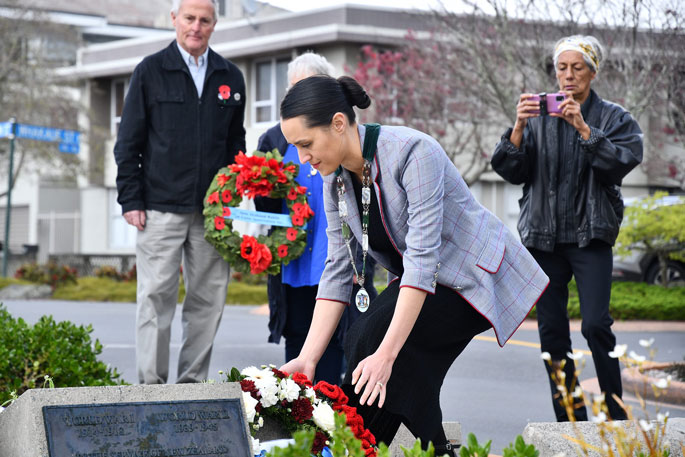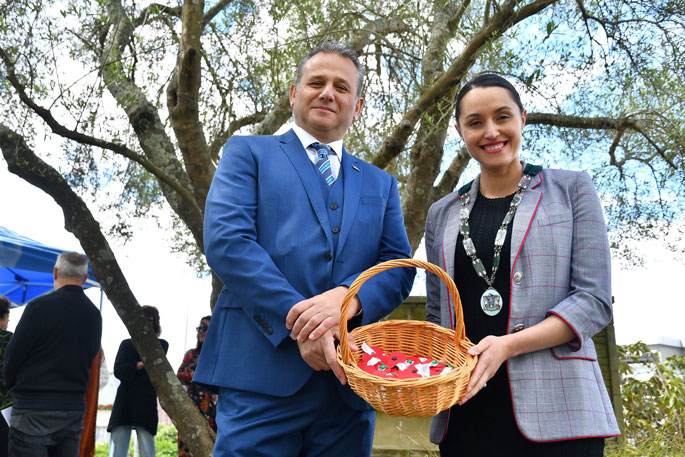For 51 years, an olive tree has been slowly growing on the edge of Rotorua’s War Memorial Park - “basically ignored”.
Now, the post-war symbol of peace and friendship between Crete and New Zealand has been formally acknowledged with a commemorative service held on Sunday.
On the morning of May 20, 1941, the Battle of Crete began.
In the 12 days that followed, 671 New Zealanders were killed on the Mediterranean island, and 2180 more became prisoners of war.
Cretans Association of New Zealand president Vasilis Giannakakis paid tribute to the New Zealanders and soldiers who fought for the people of Crete.
The battle began with a massive air attack, he told those gathered at the commemorative service on Sunday.
Whakarewarewa resident Captain Kuru Waaka of the 28th Māori Battalion received the gifted tree in 1972, after it sat in quarantine for two years. His granddaughter, Hinematioro, attended the service at the weekend.
The Battalion website said that 74 soldiers from the 28th died in the battle. Companies C and B were from the Bay of Plenty and the East Coast.
Hinematioro said despite 51 years passing, there had been no official service until Sunday. She believed there were two other trees gifted by the people of Crete; one potentially went to Ōpōtiki and the other to Gisborne.
Ngongotahā resident Martyn Evans, who had pushed for the commemoration event, had been friends with Waaka.
He had learned the history of the tree and of the Battle of Crete, with the help from the Waaka whānau following Waaka’s death.
He described to Local Democracy Reporting the strong bond New Zealand soldiers had with Cretans after those 12 days of “viciousness”.
An example was Waaka’s escape; the soldier found himself in a rural village, and speaking some Greek, asked for help from the locals.
Under the cover of darkness, a man guided him through the mountains to a waiting boat. There, Waaka found his brother, who would not leave without him.
So, how did the tree come to be?
While the history of it is vague in parts, Evans said Waaka’s escape “got the ball rolling”.
He joined the Rotorua branch of the Veterans of the Battle of Crete Association once on home soil, and the bond they had with Crete lasted.
The branch set up a university scholarship and the Cretan recipient, Argyro Vrondulaki, came to stay with some of them in the city, including with the Waaka family.
Evans learned via the Waaka whānau that a veteran brought back the olive trees, and some seeds, from Crete.
It was the scholarship recipient, who still keeps in touch with the whānau, who recently informed them it was her who planted it those 51 years ago.
Evans said the service was “glorious”.
He tried to get a service organised last year to recognise 50 years since it was planted but it could not be planned in time.
This year he tried again, asking elected members and members of Parliament.
Rotorua MP Todd McClay responded and the joint work included representatives from Ngāti Whakaue, the New Zealand Defence Force, the British High Commission and the Te Arawa Māori Returned Services League.
McClay gifted a kōwhai to Giannakakis at the service, which he said sent a reminder to the people of Rotorua what had sacrificed.
 Rotorua mayor Tania Tapsell lays a wreath at the Battle of Crete Olive Tree Commemoration. Photo / Laura Smith.
Rotorua mayor Tania Tapsell lays a wreath at the Battle of Crete Olive Tree Commemoration. Photo / Laura Smith.
At the event, Rotorua Mayor Tania Tapsell said civilians went above and beyond to show what New Zealanders call manaakitanga.
“When our soldiers were evacuated, the people of Crete continued to look after those still there ... some paid the ultimate price.”
Councillor Don Paterson was the master of ceremonies at the service.
 Rotorua councillor Don Paterson acted as master of ceremonies at the commemoration service. Photo / Laura Smith.
Rotorua councillor Don Paterson acted as master of ceremonies at the commemoration service. Photo / Laura Smith.
Speaking to Local Democracy Reporting after the event, he said the service was important.
In his view: “This particular instance had not been dealt with properly ... basically ignored.”
He felt the sacrifices of ancestors should be honoured.
“Some people might view it as just a tree.
“You just need to look to Israel, Ukraine ... it’s easy to forget the consequences of war.”
Public Interest Journalism funded through NZ On Air.




0 comments
Leave a Comment
You must be logged in to make a comment.